庆祝西方节日(thecelebrationofwestenfestivals)
- 格式:docx
- 大小:17.97 KB
- 文档页数:1
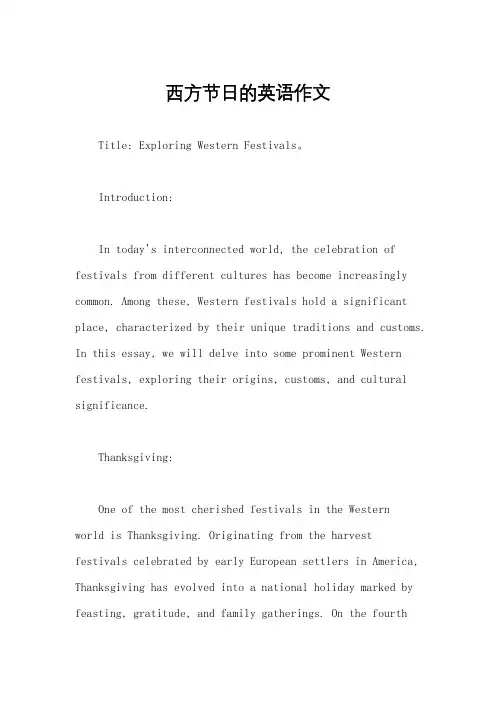
西方节日的英语作文Title: Exploring Western Festivals。
Introduction:In today's interconnected world, the celebration of festivals from different cultures has become increasingly common. Among these, Western festivals hold a significant place, characterized by their unique traditions and customs. In this essay, we will delve into some prominent Western festivals, exploring their origins, customs, and cultural significance.Thanksgiving:One of the most cherished festivals in the Westernworld is Thanksgiving. Originating from the harvestfestivals celebrated by early European settlers in America, Thanksgiving has evolved into a national holiday marked by feasting, gratitude, and family gatherings. On the fourthThursday of November, people across the United States come together to express thanks for the blessings of the past year. Traditional dishes such as roasted turkey, mashed potatoes, and pumpkin pie adorn the dinner table, symbolizing abundance and prosperity. The act of sharing a meal with loved ones fosters a sense of unity and appreciation, reinforcing the importance of gratitude in Western culture.Christmas:Christmas is another widely celebrated Western festival with deep religious roots. Observed on December 25th, Christmas commemorates the birth of Jesus Christ and is celebrated by Christians around the world. However, its cultural significance extends beyond religious boundaries, encompassing various customs and traditions embraced by people of diverse backgrounds. Decorated Christmas trees, sparkling lights, and festive carols adorn homes and streets, creating a magical atmosphere of joy and goodwill. The exchange of gifts symbolizes love and generosity, echoing the biblical story of the Three Wise Men bearinggifts for the newborn Jesus. Moreover, Christmas serves as a time for family reunions, where cherished memories are created through shared experiences and traditions.Halloween:Halloween, originating from ancient Celtic harvest festivals, has evolved into a vibrant and spirited celebration in Western culture. Observed on October 31st, Halloween is synonymous with costumes, spooky decorations, and trick-or-treating. Its origins lie in the belief that on this night, the boundary between the living and the dead is blurred, allowing spirits to roam the earth. Today, Halloween is characterized by festive gatherings, where people of all ages dress up in elaborate costumes ranging from ghouls to superheroes. Trick-or-treating, where children go from house to house collecting candy, reflects the spirit of community and generosity. Haunted houses, corn mazes, and pumpkin carving add to the excitement, creating an atmosphere of playful fright and amusement.Easter:Easter, the principal festival of the Christian calendar, celebrates the resurrection of Jesus Christ. Observed on the first Sunday after the full moon following the vernal equinox, Easter marks the culmination of Holy Week, a period of reflection and spiritual significance for Christians. The traditions associated with Easter vary across cultures, but common practices include attending church services, decorating Easter eggs, and organizing Easter egg hunts. The egg, symbolizing new life and rebirth, is central to Easter celebrations, with beautifully decorated eggs serving as tokens of joy and renewal. Additionally, Easter feasts bring families and communities together, reinforcing the bonds of fellowship and faith.Conclusion:In conclusion, Western festivals encompass a rich tapestry of traditions, beliefs, and customs that reflect the cultural diversity and heritage of the Western world. From Thanksgiving's celebration of gratitude to Christmas's message of love and generosity, from Halloween's playfulrevelry to Easter's solemn observance of faith, each festival holds a special place in the hearts of those who partake in its festivities. Through these festivals, we not only honor our past but also forge connections that transcend boundaries of time and place, uniting us in a shared celebration of life's blessings and wonders.。
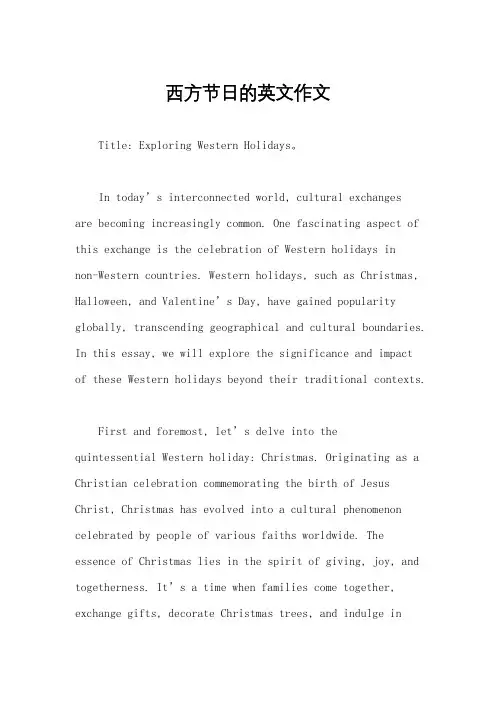
西方节日的英文作文Title: Exploring Western Holidays。
In today’s interconnected world, cultural exchangesare becoming increasingly common. One fascinating aspect of this exchange is the celebration of Western holidays innon-Western countries. Western holidays, such as Christmas, Halloween, and Valentine’s Day, have gained popularity globally, transcending geographical and cultural boundaries. In this essay, we will explore the significance and impactof these Western holidays beyond their traditional contexts.First and foremost, let’s delve into th equintessential Western holiday: Christmas. Originating as a Christian celebration commemorating the birth of Jesus Christ, Christmas has evolved into a cultural phenomenon celebrated by people of various faiths worldwide. The essence of Christmas lies in the spirit of giving, joy, and togetherness. It’s a time when families come together, exchange gifts, decorate Christmas trees, and indulge indelicious feasts. Moreover, the iconic figure of Santa Claus, with his red suit and white beard, has become synonymous with the holiday, embodying the spirit of generosity and goodwill.Another Western holiday that has captivated global interest is Halloween. Traditionally observed in Western countries like the United States, Canada, and the United Kingdom, Halloween has gradually gained popularity in other parts of the world, including Asia and Africa. Halloween, with its spooky ambiance, elaborate costumes, and trick-or-treating customs, appeals to people of all ages. It offers an opportunity for creativity and self-expression, as individuals dress up as their favorite characters, monsters, or mythical creatures. Beyond its superficial elements, Halloween serves as a platform for community bonding and festive revelry.Moving on to Valentine’s Day, this rom antic holiday celebrates love and affection between couples worldwide. While its origins are rooted in Western culture,Valentine’s Day has transcended borders and is nowembraced by people from diverse cultural backgrounds. On this day, lovers exchange gifts, cards, and gestures of affection to express their love and appreciation for each other. Restaurants and shops decked in red and pink hues offer special promotions and deals, adding to the festive atmosphere. Despite its commercialization, Valentine’s Day continues to hold sentimental value for many, serving as a reminder to cherish and celebrate love in all its forms.In addition to these mainstream holidays, other Western celebrations like Thanksgiving, Easter, and St. Patrick’s Day also garner attention globally, albeit to a lesser extent. Thanksgiving, with its emphasis on gratitude and harvest feasts, has inspired similar festivals in countries like Canada and Liberia. Easter, commemorating the resurrection of Jesus Christ, is observed with religious fervor in Christian-majority nations but is also associated with springtime festivities and egg hunts in secular contexts. St. Patrick’s Day, honoring the patron saint of Ireland, is celebrated with parades, green attire, andIrish-themed events around the world, showcasing Irish culture and heritage.The widespread adoption of Western holidays reflects the increasing globalization and cultural interconnectedness of our world. Through media, travel, and international commerce, people from different cultures are exposed to diverse traditions and practices, leading to cross-cultural pollination and hybridization of customs. While some may criticize this trend as cultural appropriation or commercialization, others view it as a celebration of diversity and shared humanity.In conclusion, Western holidays have transcended their cultural origins to become global phenomena, celebrated and embraced by people from diverse backgrounds. Whether it’s the warmth of Christmas, the spookiness of Halloween, or the romance of Valentine’s Day, these holidays resonate with individuals worldwide, fostering a sense of unity and connection amidst cultural diversity. As we continue to navigate an increasingly interconnected world, let us appreciate and celebrate the richness of our collective cultural heritage, one holiday at a time.。
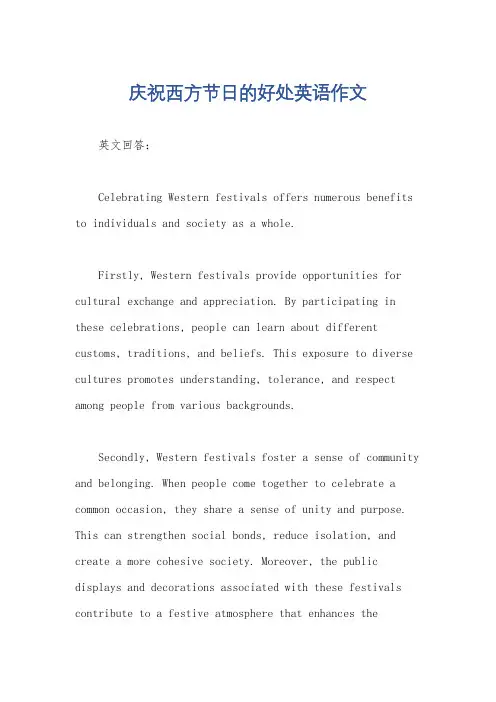
庆祝西方节日的好处英语作文英文回答:Celebrating Western festivals offers numerous benefits to individuals and society as a whole.Firstly, Western festivals provide opportunities for cultural exchange and appreciation. By participating in these celebrations, people can learn about different customs, traditions, and beliefs. This exposure to diverse cultures promotes understanding, tolerance, and respect among people from various backgrounds.Secondly, Western festivals foster a sense of community and belonging. When people come together to celebrate a common occasion, they share a sense of unity and purpose. This can strengthen social bonds, reduce isolation, and create a more cohesive society. Moreover, the public displays and decorations associated with these festivals contribute to a festive atmosphere that enhances theoverall mood of the community.Thirdly, Western festivals contribute to economic growth. The influx of tourists, increased consumer spending, and demand for goods and services during these celebrations generate revenue for businesses and stimulate economic activity. Additionally, the preparation and organization of festivals can create employment opportunities and support local industries.Furthermore, Western festivals provide a platform for creative expression and entertainment. The music, dance, art, and performances showcased during these events enrich the cultural landscape and provide opportunities for individuals to engage with and appreciate the arts. Participating in these festivities can also offer a senseof joy, relaxation, and escape from everyday life.中文回答:庆祝西方节日对个人和整个社会都有很多好处。
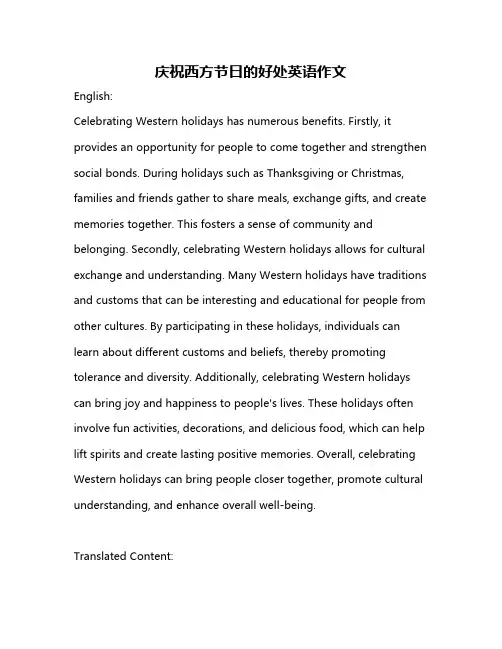
庆祝西方节日的好处英语作文English:Celebrating Western holidays has numerous benefits. Firstly, it provides an opportunity for people to come together and strengthen social bonds. During holidays such as Thanksgiving or Christmas, families and friends gather to share meals, exchange gifts, and create memories together. This fosters a sense of community and belonging. Secondly, celebrating Western holidays allows for cultural exchange and understanding. Many Western holidays have traditions and customs that can be interesting and educational for people from other cultures. By participating in these holidays, individuals can learn about different customs and beliefs, thereby promoting tolerance and diversity. Additionally, celebrating Western holidays can bring joy and happiness to people's lives. These holidays often involve fun activities, decorations, and delicious food, which can help lift spirits and create lasting positive memories. Overall, celebrating Western holidays can bring people closer together, promote cultural understanding, and enhance overall well-being.Translated Content:庆祝西方节日有许多好处。
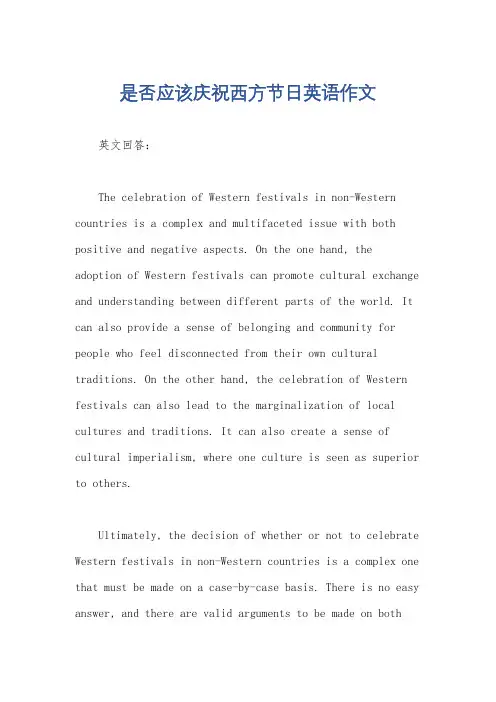
是否应该庆祝西方节日英语作文英文回答:The celebration of Western festivals in non-Western countries is a complex and multifaceted issue with both positive and negative aspects. On the one hand, the adoption of Western festivals can promote cultural exchange and understanding between different parts of the world. It can also provide a sense of belonging and community for people who feel disconnected from their own cultural traditions. On the other hand, the celebration of Western festivals can also lead to the marginalization of local cultures and traditions. It can also create a sense of cultural imperialism, where one culture is seen as superior to others.Ultimately, the decision of whether or not to celebrate Western festivals in non-Western countries is a complex one that must be made on a case-by-case basis. There is no easy answer, and there are valid arguments to be made on bothsides of the issue. However, it is important to be aware of the potential benefits and drawbacks of celebrating Western festivals before making a decision.中文回答:在非西方国家庆祝西方节日是一个复杂且多方面的议题,它有正面和负面影响。
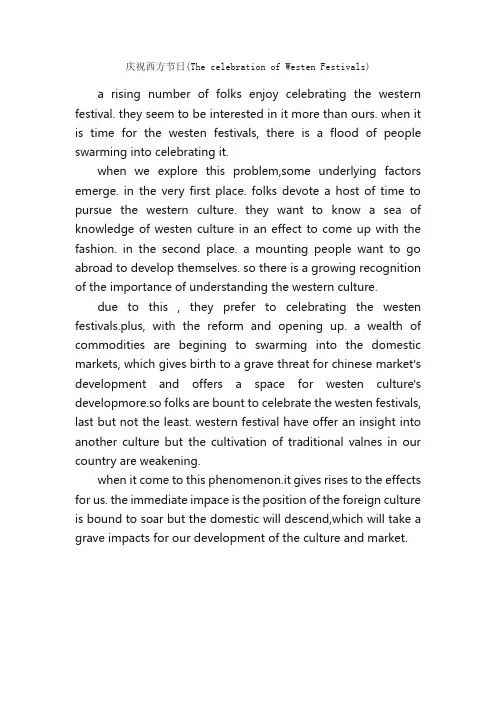
庆祝西方节日(The celebration of Westen Festivals)a rising number of folks enjoy celebrating the western festival. they seem to be interested in it more than ours. when it is time for the westen festivals, there is a flood of people swarming into celebrating it.when we explore this problem,some underlying factors emerge. in the very first place. folks devote a host of time to pursue the western culture. they want to know a sea of knowledge of westen culture in an effect to come up with the fashion. in the second place. a mounting people want to go abroad to develop themselves. so there is a growing recognition of the importance of understanding the western culture.due to this , they prefer to celebrating the westen festivals.plus, with the reform and opening up. a wealth of commodities are begining to swarming into the domestic markets, which gives birth to a grave threat for chinese market's development and offers a space for westen culture's developmore.so folks are bount to celebrate the westen festivals, last but not the least. western festival have offer an insight into another culture but the cultivation of traditional valnes in our country are weakening.when it come to this phenomenon.it gives rises to the effects for us. the immediate impace is the position of the foreign culture is bound to soar but the domestic will descend,which will take a grave impacts for our development of the culture and market.。
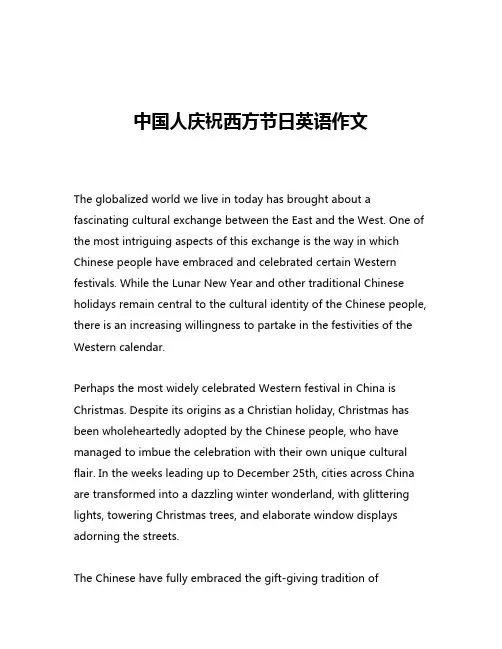
中国人庆祝西方节日英语作文The globalized world we live in today has brought about a fascinating cultural exchange between the East and the West. One of the most intriguing aspects of this exchange is the way in which Chinese people have embraced and celebrated certain Western festivals. While the Lunar New Year and other traditional Chinese holidays remain central to the cultural identity of the Chinese people, there is an increasing willingness to partake in the festivities of the Western calendar.Perhaps the most widely celebrated Western festival in China is Christmas. Despite its origins as a Christian holiday, Christmas has been wholeheartedly adopted by the Chinese people, who have managed to imbue the celebration with their own unique cultural flair. In the weeks leading up to December 25th, cities across China are transformed into a dazzling winter wonderland, with glittering lights, towering Christmas trees, and elaborate window displays adorning the streets.The Chinese have fully embraced the gift-giving tradition ofChristmas, with families and friends exchanging presents on Christmas Eve or Christmas Day. Department stores and shopping malls are bustling with activity as people search for the perfect gifts for their loved ones. Children, in particular, eagerly anticipate the arrival of Santa Claus, known in China as "Shengdan Laoren," who is believed to bring them presents if they have been good throughout the year.The culinary aspects of Christmas have also been embraced by the Chinese people. While traditional Chinese dishes remain the centerpiece of most holiday meals, many households will also prepare Western-inspired dishes, such as roast turkey, mashed potatoes, and plum pudding, to enjoy during the Christmas season. Bakeries and cafes throughout China offer a wide variety of Christmas-themed pastries and desserts, from yule logs to gingerbread men.The celebration of Christmas in China is not limited to the home, as public festivities and events have also become increasingly common. Many cities host large-scale Christmas markets, where vendors sell a variety of handicrafts, festive foods, and other holiday-themed goods. These markets often feature live music, dance performances, and other forms of entertainment, creating a festive atmosphere that draws in large crowds.Another Western festival that has gained popularity in China is Valentine's Day. While the traditional Chinese celebration of love, known as Qixi Festival, remains an important part of the cultural calendar, many young Chinese couples have also embraced the romantic traditions of Valentine's Day. On February 14th, couples can be seen exchanging gifts, such as flowers, chocolates, and teddy bears, and enjoying candlelit dinners at restaurants.The popularity of Valentine's Day in China has also given rise to a thriving commercial industry, with retailers offering a wide range of Valentine's Day-themed products and services. From personalized greeting cards to romantic getaway packages, the Chinese have found creative ways to celebrate the holiday and express their affection for one another.The adoption of Western festivals by the Chinese people is not merely a superficial imitation of foreign customs, but rather a reflection of the country's growing openness to cultural exchange and its desire to engage with the global community. By incorporating elements of these Western celebrations into their own traditions, the Chinese have demonstrated a remarkable ability to adapt and innovate, creating a unique cultural synthesis that celebrates the best of both East and West.Moreover, the embracing of Western festivals by the Chinese peoplehas had a positive impact on the country's economy and tourism industry. The increased demand for Christmas and Valentine's Day-related products and services has provided a significant boost to businesses, creating new opportunities for entrepreneurs and contributing to the overall economic growth of the country.In conclusion, the celebration of Western festivals by the Chinese people is a testament to the country's cultural dynamism and its willingness to embrace the global community. By blending traditional Chinese customs with the rituals and traditions of the West, the Chinese have created a rich tapestry of cultural exchange that celebrates the diversity and interconnectedness of our world. As the world continues to become more globalized, it is likely that we will see even more cross-cultural celebrations and the further integration of Eastern and Western traditions.。
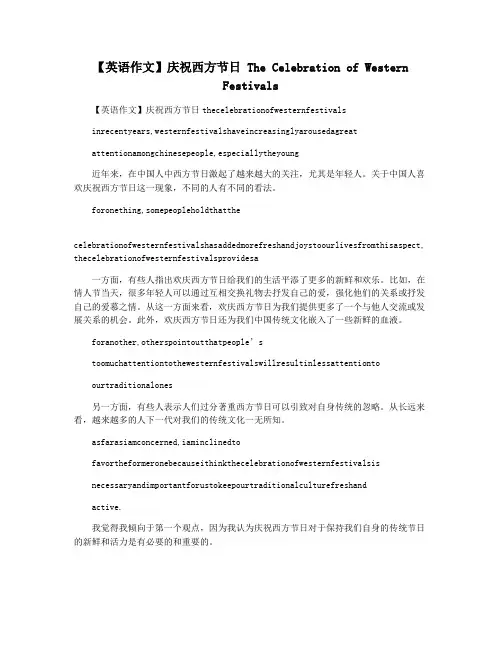
【英语作文】庆祝西方节日 The Celebration of WesternFestivals【英语作文】庆祝西方节日thecelebrationofwesternfestivalsinrecentyears,westernfestivalshaveincreasinglyarousedagreatattentionamongchinesepeople,especiallytheyoung近年来,在中国人中西方节日激起了越来越大的关注,尤其是年轻人。
关于中国人喜欢庆祝西方节日这一现象,不同的人有不同的看法。
foronething,somepeopleholdthatthecelebrationofwesternfestivalshasaddedmorefreshandjoystoourlivesfromthisaspect, thecelebrationofwesternfestivalsprovidesa一方面,有些人指出欢庆西方节日给我们的生活平添了更多的新鲜和欢乐。
比如,在情人节当天,很多年轻人可以通过互相交换礼物去抒发自己的爱,强化他们的关系或抒发自己的爱慕之情。
从这一方面来看,欢庆西方节日为我们提供更多了一个与他人交流或发展关系的机会。
此外,欢庆西方节日还为我们中国传统文化嵌入了一些新鲜的血液。
foranother,otherspointoutthatpeople’stoomuchattentiontothewesternfestivalswillresultinlessattentiontoourtraditionalones另一方面,有些人表示人们过分著重西方节日可以引致对自身传统的忽略。
从长远来看,越来越多的人下一代对我们的传统文化一无所知。
asfarasiamconcerned,iaminclinedtofavortheformeronebecauseithinkthecelebrationofwesternfestivalsisnecessaryandimportantforustokeepourtraditionalculturefreshandactive.我觉得我倾向于第一个观点,因为我认为庆祝西方节日对于保持我们自身的传统节日的新鲜和活力是有必要的和重要的。
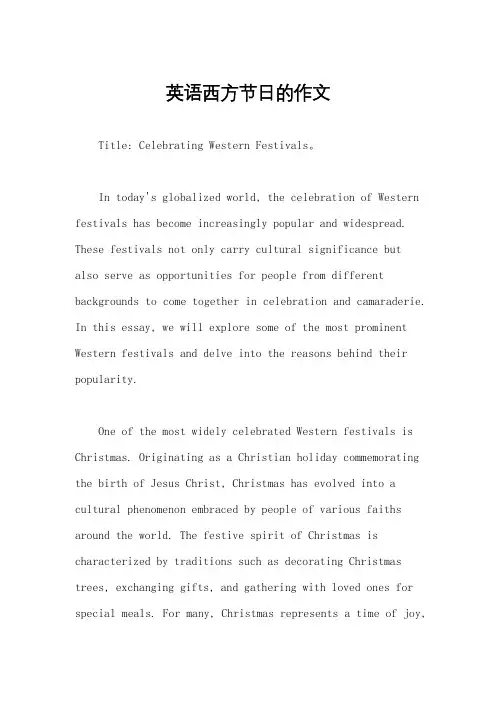
英语西方节日的作文Title: Celebrating Western Festivals。
In today's globalized world, the celebration of Western festivals has become increasingly popular and widespread. These festivals not only carry cultural significance butalso serve as opportunities for people from different backgrounds to come together in celebration and camaraderie. In this essay, we will explore some of the most prominent Western festivals and delve into the reasons behind their popularity.One of the most widely celebrated Western festivals is Christmas. Originating as a Christian holiday commemorating the birth of Jesus Christ, Christmas has evolved into a cultural phenomenon embraced by people of various faiths around the world. The festive spirit of Christmas is characterized by traditions such as decorating Christmas trees, exchanging gifts, and gathering with loved ones for special meals. For many, Christmas represents a time of joy,generosity, and togetherness, regardless of religious affiliation.Another significant Western festival is Easter, which holds religious significance for Christians as it commemorates the resurrection of Jesus Christ. However,like Christmas, Easter has transcended its religious roots to become a widely observed cultural celebration. Easter traditions include decorating eggs, participating in egg hunts, and enjoying festive meals with family and friends. The symbolism of renewal and rebirth associated with Easter resonates with people from diverse cultural backgrounds, making it a universally recognized holiday.Beyond religious festivals, Western culture also celebrates secular holidays such as Halloween and Thanksgiving. Halloween, with its origins in ancient Celtic harvest festivals, is now synonymous with costumes, trick-or-treating, and spooky decorations. It is a time for fun and frivolity, where people of all ages can embrace their creativity and imagination.Thanksgiving, on the other hand, is a uniquely American holiday that celebrates gratitude and the harvest season. Traditionally observed on the fourth Thursday of November, Thanksgiving is marked by feasting on dishes such as roasted turkey, cranberry sauce, and pumpkin pie. It is a time for reflection, appreciation, and gathering with loved ones to give thanks for the blessings of the past year.The popularity of Western festivals can be attributed to several factors. Firstly, globalization and the spread of Western media have exposed people around the world to these celebrations, sparking interest and adoption. Additionally, the universal themes of love, family, and community that permeate Western festivals resonate with people regardless of cultural background. In anincreasingly interconnected world, celebrating Western festivals has become a way for individuals to connect with others, bridge cultural divides, and foster a sense of belonging.In conclusion, Western festivals hold a special place in today's multicultural society, serving as occasions forcelebration, reflection, and unity. Whether it's the joyous festivities of Christmas, the colorful traditions of Easter, the spooky fun of Halloween, or the heartfelt gratitude of Thanksgiving, these festivals bring people together in a spirit of camaraderie and shared humanity. As we continueto embrace diversity and cultural exchange, the celebration of Western festivals will undoubtedly remain a cherished tradition for generations to come.。
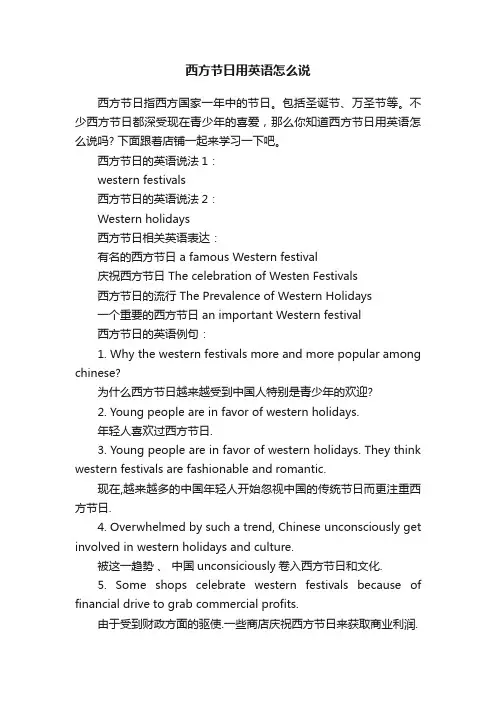
西方节日用英语怎么说西方节日指西方国家一年中的节日。
包括圣诞节、万圣节等。
不少西方节日都深受现在青少年的喜爱,那么你知道西方节日用英语怎么说吗? 下面跟着店铺一起来学习一下吧。
西方节日的英语说法1:western festivals西方节日的英语说法2:Western holidays西方节日相关英语表达:有名的西方节日 a famous Western festival庆祝西方节日 The celebration of Westen Festivals西方节日的流行 The Prevalence of Western Holidays一个重要的西方节日 an important Western festival西方节日的英语例句:1. Why the western festivals more and more popular among chinese?为什么西方节日越来越受到中国人特别是青少年的欢迎?2. Young people are in favor of western holidays.年轻人喜欢过西方节日.3. Young people are in favor of western holidays. They think western festivals are fashionable and romantic.现在,越来越多的中国年轻人开始忽视中国的传统节日而更注重西方节日.4. Overwhelmed by such a trend, Chinese unconsciously get involved in western holidays and culture.被这一趋势、中国unconsiciously卷入西方节日和文化.5. Some shops celebrate western festivals because of financial drive to grab commercial profits.由于受到财政方面的驱使.一些商店庆祝西方节日来获取商业利润.6. Ann : That's true. Christmas is the most important festival in western countries.那倒是, 圣诞节是西方国家最重要的节日.7. There are two important festivals in west countries, Easter and Christmas.在西方国家有两个重要的节日:复活节和圣诞节.8. Step II. Tell the students how St Valentine's Day came into being.学生对西方情人节非常熟悉,但是对节日的由来并不清楚.9. It is more like an international festival than a western traditional one.它越来越不像是一个西方传统节日,而是一个国际性节日.10. Do you know any western holidays?你了解西方的节日吗 ?11. April Fool's Day is a western festival.愚人节是西方的一个节日.12. In western countries, the biggest holiday is Christmas.西方国家最大的节日是圣诞节.13. Chinese young people celebrating this Western festival; some even went to the church on christmas eve.年轻人也过起了西方的节日, 还有一些人在教堂聚会联欢.14. Some major western holidays, as Christmas and Valentine's Day, have become popular in Wenzhou.现在,一些西方著名的节日民俗也在温州流行起来, 如圣诞节、情人节等.15. Spring Festival is a family reunion holiday, and this is very similar the Western Christmas.春节是个亲人团聚的节日, 这一点和西方的圣诞节很相似.。
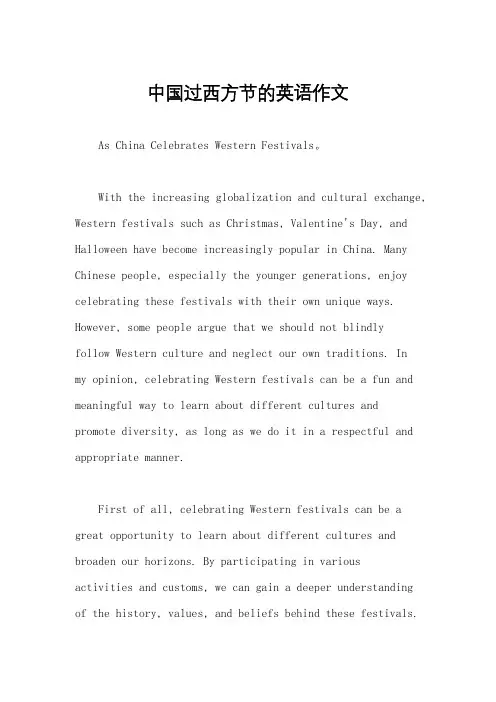
中国过西方节的英语作文As China Celebrates Western Festivals。
With the increasing globalization and cultural exchange, Western festivals such as Christmas, Valentine's Day, and Halloween have become increasingly popular in China. Many Chinese people, especially the younger generations, enjoy celebrating these festivals with their own unique ways. However, some people argue that we should not blindlyfollow Western culture and neglect our own traditions. Inmy opinion, celebrating Western festivals can be a fun and meaningful way to learn about different cultures and promote diversity, as long as we do it in a respectful and appropriate manner.First of all, celebrating Western festivals can be a great opportunity to learn about different cultures and broaden our horizons. By participating in variousactivities and customs, we can gain a deeper understandingof the history, values, and beliefs behind these festivals.For example, Christmas is not only about Santa Claus andgift-giving, but also has a religious significance for Christians. By attending church services or learning about the Nativity story, we can appreciate the spiritual aspectof Christmas. Similarly, Valentine's Day is not just a commercialized holiday for couples, but also has a romantic and literary heritage that dates back to ancient Rome. By reading love poems or watching romantic movies, we can explore the beauty of love and emotions.Secondly, celebrating Western festivals can promote cultural diversity and tolerance. In a world wheredifferent cultures and religions often clash, it is important to respect and appreciate each other's differences. By embracing Western festivals, we can showour openness and acceptance towards other cultures, andalso share our own traditions with others. For example, many Chinese people celebrate Christmas by decorating their homes with Christmas trees, exchanging gifts, and having a festive dinner with family and friends. At the same time, they also incorporate Chinese elements such as red lanterns, dumplings, and dragon dances into the celebration, creatinga unique fusion of cultures. This not only adds to the richness and diversity of our society, but also promotes mutual understanding and harmony.However, it is also important to celebrate Western festivals in a respectful and appropriate manner. We should not blindly imitate or commercialize these festivals, but rather understand and respect their cultural origins and meanings. For example, some people may wear inappropriate costumes or play pranks on Halloween, which can beoffensive or disrespectful to certain cultures or religions. We should also avoid excessive consumption or waste of resources, and instead focus on the spiritual and emotional aspects of the festivals. By doing so, we can preserve our own traditions while embracing the diversity of other cultures.In conclusion, celebrating Western festivals can be a fun and meaningful way to learn about different culturesand promote diversity, as long as we do it in a respectful and appropriate manner. By embracing the values andtraditions of other cultures, we can broaden our horizonsand enrich our lives. At the same time, we should also cherish and preserve our own traditions, and strive to create a harmonious and inclusive society.。
中学英语作文:中国人应该庆祝西方节日吗Today, more and more young people are crazy about western festivals. When western festivals come, they usually go to restaurants or shopping malls to have fun.Why do the young enjoy western festivals so much? Since they worship everything new, and they can’t resist the temptation. In their opinions, western festivals symbolize the fashion, while our Chinese traditional festivals are out of date. No wonder we always feel so boring during our traditional holidays. If we still turn a blind eye to our traditional festivals, our culture and civilization will disappear someday. Accordingly, it is high time for us to pay close attention to our Chinese festivals.As a Chinese, we have the obligation to protect our culture and custom. So I think we should celebrate our Chinese festivals by doing some traditional activities. As for western festivals, we needn’t to be too excited about them. We can just send our best wishes to our best friends during those festivals.如今,越来越多的年轻人都对西方的节日着迷。
在中国庆祝西方节日的看法英语作文全文共6篇示例,供读者参考篇1Celebrating Western Festivals in ChinaHi everyone! My name is Lily, and I'm a primary school student in China. Today, I want to share with you my thoughts on celebrating Western festivals in China.In recent years, Western festivals like Christmas and Halloween have become more popular in China. People of all ages, including children like me, enjoy participating in these festivities. It's a lot of fun! But why do we celebrate these Western festivals in China?First of all, celebrating Western festivals allows us to learn about different cultures from around the world. China has a rich history and many traditional festivals, but it's also exciting to explore the customs and traditions of other countries. By celebrating Western festivals, we can broaden our horizons and appreciate the diversity of our global community.Secondly, celebrating Western festivals promotes cultural exchange. When we celebrate Christmas or Halloween, we get the chance to interact with people from different countries and backgrounds. We learn about their traditions, share our own, and build friendships. It's a wonderful way to promote understanding and harmony among people from different cultures.Moreover, celebrating Western festivals adds more joy and excitement to our lives. Imagine decorating Christmas trees, exchanging gifts, and singing carols with our friends and family. It brings us together and creates a warm and joyful atmosphere. Similarly, Halloween allows us to dress up in costumes, gotrick-or-treating, and have lots of fun with our friends. These celebrations bring happiness and laughter to our lives.Some people might wonder whether celebrating Western festivals will make us forget our own traditions. Well, I don't think so. Chinese festivals like Spring Festival and Mid-Autumn Festival hold a special place in our hearts, and we continue to celebrate them with great enthusiasm. Western festivals are simply an addition to our already rich cultural tapestry. They provide us with new experiences while allowing us to cherish our own traditions.In conclusion, celebrating Western festivals in China is a great way to learn about different cultures, promote cultural exchange, and add more joy to our lives. As a primary school student, I enjoy participating in these festivities and look forward to celebrating them each year. Let's embrace the diversity of our world and celebrate together!That's all for now, my friends. Thank you for listening to my thoughts on celebrating Western festivals in China. I hope you enjoyed it!篇2Celebrating Western Holidays in ChinaHi there! My name is Xiaoling and I'm 10 years old. I live in Beijing with my mom, dad, and little brother Xiaoming. I love going to school, playing with my friends, and learning about different cultures from around the world. One thing that's really interesting is how we celebrate some Western holidays here in China!Christmas is probably the most popular Western holiday in China. Even though most Chinese people don't follow Christianity, a lot of us still get really excited about Christmas every year. In the weeks leading up to December 25th, all the bigshopping malls put up these huge, beautifully decorated Christmas trees. The trees have bright lights, shiny ornaments, tinsel, and sometimes even fake snow around the base! My parents always take me and Xiaoming to see the Christmas tree lighting ceremonies and take pictures.Another fun Christmas tradition is giving out apples on Christmas Eve. The Chinese word for Christmas Eve ("Ping An Ye") sounds a bit like the word for apple ("Ping Guo"). So we hand out apples to our friends and families as a way to celebrate. Last year, my class had a little party and we all brought in apples to share and exchange as gifts. My best friend Liyuan gave me a lovely red apple and I gave her a green one. The teachers also taught us about Santa Claus, Christmas carols, and other Western Christmas customs.Stores and restaurants go all out for Christmas too. They hang up wreaths, put Christmas figures in the windows, and play non-stop Christmas music. My mom's favorite restaurant even has their staff dress up like Santa's elves in green costumes! A lot of stores sell Christmas treats like gingerbread men cookies, chocolate Santas, candy canes, and hot chocolate. I always bug my parents to buy me lots of those sugary snacks.On Christmas Day, we don't really have any special traditions other than maybe eating a nice dinner together as a family. But the excitement and festive spirit leading up to it is so much fun! I love seeing all the decorations, listening to the cheerful music, and eating little Christmas candies.Another popular Western holiday in China is Valentine's Day on February 14th. Tons of stores and malls have huge Valentine's Day sales leading up to it. They sell plushie teddy bears,heart-shaped chocolates, roses, cute greeting cards, and lots of other lovey-dovey gifts. All my friends at school exchange little Valentines with each other too. We make them out of pink and red construction paper and write nice messages inside.For Valentine's Day, a lot of couples go out for fancy dinners or give each other presents like jewelry. Single people also celebrate by going out with their friends or pampering themselves. Last year, my aunt who doesn't have a boyfriend went and got a makeover with a new haircut and outfit and took herself out to her favorite restaurant. Even kids like me celebrate Valentine's Day by giving out cards and candies to our classmates. I always save the nicest card for my crush Zhang Ziming!Halloween is another Western holiday that has gotten pretty popular in China over the past few years, especially among young people. A lot of bars and nightclubs throw huge Halloween costume parties and contests. My older cousins who are in university love dressing up in crazy costumes like zombies, vampires, witches and going out dancing with their friends.For kids, some schools let us come dressed up in costumes for Halloween too. It's so fun seeing everyone's creative outfits! Last year, I dressed up as my favorite superhero Spider-Man and Xiaoling went as a little devil with face paint, a red bodysuit, and a pitchfork. Our teachers organized a little costume parade and we got to show off our looks and got candy as prizes.Shopping malls and stores in the big cities make a huge deal out of Halloween as well. They decorate with pumpkins, fake tombstones, ghosts, and cobwebs everywhere. You can buy Halloween costumes, candy, masks, and decorations weeks before the 31st. It's funny seeing all the gory, spooky stuff mixed in with the bright, modern shopping mall settings. I overheard some grandparents saying they thought it was a bizarre and inappropriate holiday to celebrate! But us kids absolutely love it.Those are the three main Western holidays that have gained a lot of popularity in China over the past years - Christmas,Valentine's Day, and Halloween. Even though none of them are actually traditional Chinese holidays, a lot of people have fun celebrating them in their own unique ways. Companies use them as excuses for sales and promotions. Young people enjoy the festive parties and kid-friendly activities. I know I always look forward to the special decorations, treats, and events for each one!Celebrating Western holidays in China is a way for people to experience different cultures and have new adventures. But we still hold on to our own long-standing Chinese traditions like Chinese New Year, Mid-Autumn Festival, and Dragon Boat Festival. Those will always be the most important and meaningful celebrations for us. The Western holidays are just fun additions that make the year even more exciting and filled with variety.I think introducing some Western customs helps make China an even more diverse, inclusive, and open-minded society. It exposes people to new cultures and ideas beyond just our own. As a kid, I enjoy learning about the interesting myths, stories, and symbols behind holidays like Christmas and Halloween. And who doesn't love an excuse to eat lots of candy, decorate, and have a good party?So while some think celebrating Western holidays goes against Chinese values, I believe it actually brings more richness and joy into our lives. As long as we keep respecting our own traditions, exploring new cultures can only teach us to be smarter and more accepting global citizens. Holidays are always better with friends anyways. The more the merrier, I say! Maybe one day I'll even get to visit the West and experience Christmas, Halloween, and Valentine's Day in their home countries. But until then, I'll celebrate them the fun, creative Chinese way!篇3Celebrating Western Holidays in ChinaMy name is Xiaoming and I'm 10 years old. I live in a big city in China with my mom, dad, and little sister. Even though we're Chinese, our family loves celebrating some Western holidays! It's really fun and I've learned a lot about other cultures by taking part in these holidays.My favorite Western holiday is definitely Christmas! I love all the bright decorations, twinkling lights, and festive trees. Every year, my parents take me and my sister to a big shopping mall to see the amazing Christmas displays. Last year, there was a hugeSanta Claus figure made out of thousands of sparkling lights! It was so cool.At home, we put up a small Christmas tree and decorate it with colorful ornaments. My dad always puts the star or angel on top. We also hang candy canes and stockings. Sometimes we make paper chains out of red and green construction paper to string around the house. It makes everything look so cheerful!On Christmas Eve, we have a special dinner together as a family. We make some traditional Chinese dishes, but we also incorporate Western foods like roast turkey or ham. One of my favorite parts is singing Christmas carols after our meal. Even though I don't understand all the words, I like the melodies. Then we let my sister open one present before bedtime as a treat.The best part is waking up on Christmas morning to open the rest of our gifts! Santa Claus always leaves presents for me and my sister under the tree. My parents spoil us by getting toys, clothes, books, and other fun stuff we've been wanting all year. After the present frenzy, we have a big breakfast feast.I don't really understand the religious meanings behind Christmas since I'm not Christian. But I think it's a beautiful tradition that brings families together through giving, food, and celebration. My parents want my sister and me to havewell-rounded perspectives by experiencing diverse customs. That's one of the great things about living in such an international city.Another Western holiday my family partakes in is Halloween.A couple weeks before Halloween, we like to decorate our home with carved pumpkins, fake cobwebs, and spooky figures. Making the jack-o-lanterns is my favorite activity! My dad lets me scoop out the gooey insides of the pumpkin and then I get to design a funny or scary face to carve into it.On Halloween night, my friends and I dress up in fun costumes like superheroes, ghosts, monsters, or fictional characters. My mom helps do my makeup or mask to make my costume look really authentic. Then we go trick-or-treating around our neighborhood! I feel like a little kid again ringing each doorbell and shouting "Trick or treat!" It's always exciting to see what candy people will put into my bag.When we get back home, my parents let us trade candies with each other to get our favorite kinds. Then we'll watch anot-too-scary Halloween movie together while eating some of our sugary loot. The next day at school is just as fun because we get to parade around in our costumes and play games.I think Halloween is such a cool tradition because it lets kids be creative with their costumes and use their imaginations. The spooky elements also make it an eerie, thrilling experience. But it's all just meant to be light-hearted fun without any religious stuff behind it. Dressing up and trick-or-treating is simply entertaining for kids.My family also celebrates Valentine's Day, which is a Western holiday focused on love and romance. For this holiday, we don't go quite as all-out as Christmas and Halloween. But it's still a fun excuse to do special activities centered around the heart theme.A week or two before Valentine's Day, my mom takes me and my sister to a craft store. We each pick out supplies to make homemade valentines for our classmates, friends, teachers, and relatives. I like to use construction paper, doilies, stickers, and plenty of glitter to create my valentines. Some years I've made lollipop treats or small bags of candy to attach to them.On Valentine's Day, my sister and I wear our favorite pink, red, or white outfits to school. We hand out the valentines we made to our classmates and teachers. At school, we usually have a small party where we play games, watch movies, and eat heart-shaped snacks. Some of my friends even bring in candy or little gifts for their crushes!In the evening, we have a special Valentine's dinner at home. My mom always makes heart-shaped cheese pizzas and sugar cookies for us. Sometimes my dad will surprise her with a box of chocolates or flowers from the store. My sister and I make handmade cards for our parents too. We also like to watch romantic-comedy movies together and cuddle up with blankets, popcorn, and sweets.While Valentine's Day is mainly a romantic holiday for couples, I still enjoy celebrating it as a family affair. It allows us to express our love and appreciation for each other through small tokens and quality time together. Plus, the crafts and treats make it a lot of fun! I may not understand the meaning of romantic love yet, but I know how lucky I am to be surrounded by so much care and affection at home.Overall, I feel really fortunate that my parents have introduced me to Western holiday traditions on top of celebrating our own Chinese holidays. It has expanded my understanding of diverse cultures from an early age. These Western holidays have provided me with so many joyful memories centered around family time, creativity, food, and festivity. While I take pride in my Chinese heritage, I'm grateful to have been exposed to these international customs as well.Perhaps when I'm older, I'll carry on the tradition of celebrating them with my own family someday!篇4Celebrating Western Holidays in ChinaMy name is Xiaoming and I'm a 10-year-old student in China.I love holidays because it means no school and lots of fun! In China, we celebrate many traditional Chinese festivals like Chinese New Year, Mid-Autumn Festival, and Dragon Boat Festival. But some of my favorite holidays are the Western ones we get to celebrate too!The first big Western holiday of the year is Christmas on December 25th. I get so excited when the Christmas decorations start going up around town! The stores are filled with sparkly trees, twinkling lights, Santa Claus figures, and presents galore. My parents always buy a small Christmas tree for our apartment and let me help decorate it with ornaments and tinsel. We hang up stockings and wait for Santa to come!On Christmas Eve, we have a special family dinner, usually with a whole roasted chicken or duck. Sometimes my grandparents come over too. After dinner, we let open one present each before going to bed. I can hardly sleep, wonderingwhat Santa will bring! In the morning, there are always prettily wrapped gifts under the tree from Santa. We spend the whole day playing with our new toys and eating Christmas treats like chocolate santas and sugared fruits.Even though Christmas started as a Western Christian holiday, lots of people in China celebrate it now just for fun. We may not go to church, but we still get into the festive spirit! Going to look at the beautiful lights and decorations in the big cities like Shanghai is one of my favorite Christmas traditions. Some of my friends who are Christian do go to special church services too.Another Western holiday I love is Halloween on October31st. It's all about dressing up in spooky costumes like ghosts, zombies, vampires, and witches. My little sister and I spend weeks planning our costumes each year! Sometimes we make them ourselves out of old clothes and face paint. Other years we buy pre-made ones from the Halloween stores that pop up in September.On Halloween night, we go trick-or-treating around the neighborhood ringing doorbells and yelling "Trick or treat!" Whoever answers has to put candy in our bags. If they don't have any candy, we're allowed to play a small prank or "trick" on theminstead of getting a treat. Good thing most people are ready with candies! By the end of the night, our pumpkin basket is full of chocolates, gummies, hard candies, and lollipops. What a sugar rush!Teenagers and young adults in China also really get into Halloween too. They throw big costume parties and horror movie marathons. You see people all decked out in scary makeup and elaborate costumes around clubs and city centers trying to look as creepy as possible. Haunted house attractions pop up for a spooky thrill too. Even though Halloween started as an ancient Celtic pagan festival, now it's just a fun excuse to get dressed up and eat candy in China!My absolute favorite Western holiday is Valentine's Day on February 14th. It's all about celebrating love and romance! Stores are decorated with hearts, cupids, roses, and messages about love. In the week leading up to it, my classmates and I make handmade cards with glitter, lace, and sweet messages to give to our friends, parents, and teachers. We also buy small chocolates, plush toys, and other little gifts covered in hearts.On Valentine's morning, everyone comes to school carrying their backpacks stuffed with lovey-dovey cards and treats to exchange with each other. We spend the whole day celebratingfriendship and handing out valentines to our pals. Some kids even shyly give a card to their secret crush! At home after school, my dad always gets my mom a beautiful bouquet of red roses and takes us all out for a fancy dinner. Love is in the air!For teenagers and adults in China, Valentine's Day is the biggest date night of the year. Couples go all out with candlelit dinners,roses, chocolates, stuffed animals, and romantic proposals. Some even get married on that day because of how lucky it's supposed to be! Stores make tons of money selling cherubs, scented candles, pink balloons, and other couple-y stuff. Whether you're single or coupled up, it's a fun day to celebrate love.Even though these holidays have their origins in the West, Chinese people have embraced them with open arms over the past few decades. We may celebrate them a bit differently, mixing Western and Eastern customs together. But the spirit of the holidays is still there - family,friends, fun, and making magical memories. I can't wait for the next round of Western holiday celebrations to start!篇5Celebrating Western Holidays in ChinaMy name is Xiaoming and I am 10 years old. I live in a big city in China with my mom, dad, and little sister. In my family, we celebrate all kinds of holidays – Chinese holidays like Chinese New Year and Mid-Autumn Festival, but also Western holidays like Christmas and Halloween. I really enjoy celebrating the Western holidays because they are different and fun!Christmas is probably my favorite Western holiday to celebrate. Every year in December, my parents take me and my sister to the big shopping malls and we look at all the cool Christmas decorations – the trees covered in lights and ornaments, the fake snow and icicles hanging from the ceilings, and the big inflatable Santas outside the mall entrances. The stores play Christmas music over their speakers and sometimes there are people dressed up as Santa Claus walking around the malls. It gets me really excited for Christmas!At home, we decorate a small Christmas tree and hang stockings for Santa to fill with little gifts and candy. On Christmas Eve, my sister and I leave out cookies and milk for Santa, and in the morning the cookies are gone and the stockings are filled with presents! I know it's just my parents doing it, but it's still fun to pretend. On Christmas day, we open the bigger presentsunder the tree. My favorite things I've gotten are my scooter, remote control car, and video games.We don't really do the religious parts of Christmas since we aren't Christian. But we still like celebrating the fun traditions like the tree, Santa Claus, and getting presents. My grandparents think it's a silly holiday, but my parents say it's good for me and my sister to learn about different cultures and traditions from around the world. I agree – I like getting exposed to customs that are different from the typical Chinese way.Another really fun Western holiday we celebrate is Halloween. A few weeks before Halloween, my mom takes us to the stores to pick out costumes. One year I was a superhero, another year I was a pirate, and last year I went as Harry Potter. My sister has been a princess, a witch, and a cat. On Halloween night, we get dressed up and go trick-or-treating around our apartment building complex with our neighbors and friends. The apartment guards and our neighbors give out candy, and we walk around door-to-door saying "trick-or-treat!" At the end of the night, we take all of our candy home and sort it into piles. Halloween is great because you get to wear cool costumes and get lots of free candy!At school, my class always has Halloween parties and activities. We play games like bobbing for apples, decorate pumpkins, and have costume contests. My teachers tell us about the origins of Halloween and its pagan root customs like dressing up as ghosts and goblins to scare away spirits. But these days, Halloween in China is just about having fun, not about any religion or spirituality.While Christmas and Halloween are the biggest Western holidays we celebrate, we also do some other smaller ones like Valentine's Day and St. Patrick's Day. For Valentine's Day, my dad buys my mom flowers and chocolate. For St. Patrick's Day, we eat green-colored foods like green pancakes or shamrock-shaped cookies. The celebrations aren't huge, but it's still fun to recognize those holidays in little ways.Overall, I really enjoy celebrating Western holidays in addition to China's traditional holidays. They give me a chance to experience different cultures and have new experiences apart from the typical Chinese festivals. Decorating the Christmas tree, dressing up for Halloween, exchanging Valentine's Day gifts –they're all lighthearted, joyful traditions that make the holidays even more fun and exciting as a kid. While we celebrate the Western holidays in a pretty secular way without following thereligious meanings, they're still great opportunities for festivity, merriment, and spending quality time with family. I look forward to them every year!篇6当中国庆祝西方节日你好!我是一名小学生,今天我要和你分享一下中国庆祝西方节日的看法。
庆祝西方节日的英文作文Title: Celebrating Western Holidays。
In today's globalized world, celebrating Western holidays has become increasingly common, even in non-Western cultures. These holidays, with their richtraditions and vibrant festivities, offer an opportunityfor people of all backgrounds to come together and share in the joy of the occasion. In this essay, we will explore the significance of celebrating Western holidays and the impact it has on individuals and communities around the world.First and foremost, participating in Western holidays allows individuals to broaden their cultural horizons and gain a deeper appreciation for diverse traditions. Whether it's celebrating Christmas, Easter, Halloween, or Thanksgiving, each holiday has its own unique customs, symbols, and rituals that provide insight into the values and beliefs of Western societies. By taking part in these celebrations, people from different cultural backgroundscan learn about the history and significance of these holidays, fostering greater understanding and tolerance among diverse communities.Moreover, celebrating Western holidays can also serve as a way to strengthen bonds within families and communities. For many people, these holidays are a time for gathering with loved ones, sharing meals, exchanging gifts, and creating lasting memories. Whether it's decorating a Christmas tree, carving pumpkins for Halloween, or preparing a Thanksgiving feast, these shared experiences help to reinforce familial ties and create a sense of belonging and unity.In addition, embracing Western holidays can have positive economic implications for local businesses and industries. As these holidays gain popularity around the world, there is a growing demand for related products and services, ranging from decorations and costumes to special meals and gifts. This presents an opportunity for businesses to capitalize on the festive spirit by offering unique and culturally relevant products, therebystimulating economic growth and creating employment opportunities within the community.Furthermore, celebrating Western holidays can promote cultural exchange and tourism, as people from different parts of the world travel to experience these festivities firsthand. Whether it's attending the Macy's Thanksgiving Day Parade in New York City, visiting Christmas markets in Europe, or exploring haunted houses during Halloween in the United States, these events attract millions of tourists each year, generating revenue for local businesses and showcasing the cultural heritage of the host country.However, it is important to recognize that the commercialization of Western holidays can sometimes overshadow their true meaning and significance. In recent years, there has been a growing trend towards excessive consumerism and materialism during these holidays, with an emphasis on extravagant gifts and lavish celebrations. This can lead to a loss of focus on the underlying values of compassion, gratitude, and goodwill towards others, which are central to many Western holiday traditions.In conclusion, celebrating Western holidays offers a valuable opportunity for cultural exchange, community bonding, and economic prosperity. By embracing these traditions with respect and appreciation, individuals and communities around the world can come together to celebrate the richness and diversity of human culture. However, it is essential to maintain a balance between the festive spirit and the true essence of these holidays, ensuring that they remain meaningful and relevant for generations to come.。
英语中西方节日小作文Title: Celebrating Western Holidays: A Cross-Cultural Perspective。
Introduction:In today's interconnected world, cultural exchange has become increasingly prevalent. One area where this exchange is particularly evident is in the celebration of holidays. Western holidays, in particular, have gained popularity and recognition across the globe. This essay will explore the significance of some prominent Western holidays and how they are celebrated in different parts of the world.Christmas:Christmas is perhaps the most widely celebrated Western holiday worldwide. Originating as a Christian festival commemorating the birth of Jesus Christ, it has evolvedinto a cultural phenomenon embraced by people of variousreligious and cultural backgrounds. In Western countries, Christmas is typically marked by traditions such as decorating Christmas trees, exchanging gifts, and sharing festive meals with family and friends. However, its observance varies significantly in different regions.In some Asian countries like Japan and South Korea, Christmas is celebrated more as a secular event rather than a religious one. It's often seen as an opportunity for couples to spend time together, akin to Valentine's Day in the West. In these countries, you might see Christmaslights adorning streets and storefronts, and people enjoying romantic dinners. In predominantly Muslim countries, Christmas is observed by minority Christian communities, but its celebration is more subdued compared to Western nations.Easter:Easter is another significant Western holiday with religious origins. It commemorates the resurrection of Jesus Christ and is celebrated on the first Sundayfollowing the first full moon after the vernal equinox. While Easter is widely observed in Western countriesthrough religious services, Easter egg hunts, and family gatherings, its observance is less prevalent in other parts of the world.In some countries like Australia and the United Kingdom, Easter is associated with traditions such as decorating eggs, baking hot cross buns, and organizing communityevents like egg rolling competitions. However, in countries with predominantly non-Christian populations, Easter may pass largely unnoticed or be observed only by Christian communities.Halloween:Halloween, with its origins in Celtic and Christian traditions, has become increasingly popular outside of its Western origins. It is celebrated on the night of October31st, preceding All Saints' Day. Traditionally, Halloween was associated with activities like trick-or-treating, costume parties, and carving jack-o'-lanterns.In recent years, Halloween has gained traction in countries like Japan and South Korea, where it's embracedas a fun and festive occasion. Department stores and businesses often organize Halloween-themed events, andyoung people enjoy dressing up in costumes and attending parties. However, in some cultures, Halloween's association with the supernatural and the macabre may lead toresistance or reluctance to adopt its customs.Thanksgiving:Thanksgiving, celebrated primarily in the United States and Canada, is a holiday steeped in history and tradition.It originated as a harvest festival and is now observed asa day of giving thanks for the blessings of the harvest and the preceding year. Thanksgiving is marked by a large feast, typically featuring turkey, stuffing, cranberry sauce, and pumpkin pie.While Thanksgiving is deeply ingrained in American and Canadian culture, its observance is not widespread outsideof these countries. However, in recent years, expatriate communities and international students have introduced Thanksgiving celebrations in various parts of the world. These gatherings often serve as opportunities for people from diverse backgrounds to come together and share a meal, fostering a sense of community and gratitude.Conclusion:In conclusion, Western holidays have transcended their cultural origins to become global phenomena celebrated in diverse ways across the world. While some holidays retain their religious significance, others have evolved into secular festivities embraced by people of all backgrounds. As globalization continues to shape our world, the celebration of Western holidays serves as a testament to the power of cultural exchange and the universality of human traditions.。
西方节日的盛行英语作文The Prevalence of Western Festivals: A Global Phenomenon.In the tapestry of human culture, festivals serve as vibrant threads that connect communities, celebrate heritage, and foster shared experiences. Western festivals, originating from diverse origins, have permeated the global landscape, becoming integral to societies worldwide. The widespread adoption of these festivals speaks volumes about their enduring appeal and the transformative power of cultural exchange.Origins and Evolution.Western festivals trace their roots to ancient traditions and religious practices. From the Roman Saturnalia to the Celtic Samhain, these celebrations marked significant seasonal changes or commemorated important deities. Over time, these festivals evolved, absorbinginfluences from Christianity and blending with local customs. The resulting hybrid traditions showcased the dynamic nature of cultural interaction.Christmas: A Global Icon.Among Western festivals, Christmas stands as the most widely celebrated. Originating as a Christian holiday commemorating the birth of Jesus, it has morphed into a secular event marked by gift-giving, festive gatherings,and the iconic Santa Claus figure. Christmas transcends religious boundaries, becoming a symbol of joy, generosity, and family togetherness in cultures across the globe.Halloween: Spooky and Enchanting.Halloween, with its origins in Celtic traditions, has become a global phenomenon that celebrates the mystical realm. Children don costumes and knock on doors for treats, while adults indulge in horror movies and spooky parties. Halloween's popularity stems from its playful blend of fear, excitement, and the allure of the supernatural.Thanksgiving: Gratitude and Abundance.Thanksgiving, a uniquely American holiday, celebrates the harvest and the blessings of life. Rooted in English and Puritan traditions, Thanksgiving has spread to other countries, fostering gratitude for bountiful resources and the bonds of community. The traditional meal of turkey, mashed potatoes, and stuffing evokes feelings of warmth, family, and shared prosperity.Valentine's Day: Love and Romance.Valentine's Day, inspired by the Roman festival of Lupercalia, has become a global emblem of love and romance. Originally celebrated to purify the city, it evolved into a day of amorous expressions. Today, Valentine's Day is marked by exchanging gifts, cards, and tokens of affection, reminding us of the enduring power of human connection.Cultural Significance.The prevalence of Western festivals in diversesocieties highlights their universal appeal. These celebrations provide opportunities for people to connect with their heritage, express their creativity, and experience the joy of shared traditions. They create a sense of belonging and foster a shared cultural identity, bridging geographical and cultural divides.However, the adoption of Western festivals also raises questions about cultural appropriation and the potential erasure of local traditions. It is essential to approach these celebrations with respect for their origins and to maintain a balance between embracing diversity and preserving cultural distinctiveness.Conclusion.The widespread celebration of Western festivals across the globe is a testament to the interconnectedness of human culture. From the iconic Christmas tree to the spooky Halloween pumpkin, these traditions have become ingrainedin our collective consciousness, fostering bonds, sparkingjoy, and enriching the human experience. As we navigate the complexities of cultural exchange, it is crucial to recognize the beauty and significance of both local and global traditions, allowing them to coexist harmoniously and contribute to the vibrant tapestry of global culture.。
中学英语作文:中国人应该庆祝西方节日吗【 - 节日类英语作文】Today, more and more young people are crazy about western festivals. When western festivals come, they usually go to restaurants or shopping malls to have fun.Why do the young enjoy western festivals so much? Since they worship everything new, and they can’t resist the temptation. In their opinions, western festivals symbolize the fashion, while our Chinese traditional festivals are out of date. No wonder we always feel so boring during our traditional holidays. If we still turn a blind eye to our traditional festivals, our culture and civilization will disappear someday. Accordingly, it is high time for us to pay close attention to our Chinese festivals.As a Chinese, we have the obligation to protect our culture and custom. So I think we should celebrate our Chinese festivals by doing some traditional activities. As for western festivals, we needn’t to be too excited about them. We can just send our best wishes to our best friends during those festivals.如今,越来越多的年轻人都对西方的节日着迷。
庆祝西方节日(The celebration of Westen Festivals)
a risi ng nu mber of folks enjoy celebrati ng the western festival. they seem to be in terested in it more tha n ours, whe n it is time for the weste n festivals, there is a flood of people swarmi ng into celebrati ng it.
whe n we explore this problem,some un derly ing factors emerge. in the very first place. folks devote a host of time to pursue the western culture. they want to know a sea of knowledge of weste n culture in an effect to come up with the fashi on. in the sec ond place. a moun ti ng people want to go abroad to develop themselves. so there is a grow ing recog niti on of the importa nee of un dersta nding the wester n culture.
due to this , they prefer to celebrati ng the weste n festivals.plus, with the reform and ope ning up. a wealth of commodities are begi ning to swarmi ng in to the domestic markets, which gives birth to a grave threat for chin ese market's developme nt and offers a space for weste n culture's developmore.so folks are bount to celebrate the westen festivals, last but not the least. western festival have offer an in sight into ano ther culture but the cultivati on of traditi onal valnes in our country are weake ning.
whe n it come to this phe nomenon .it gives rises to the effects for us. the immediate impace is the positi on of the foreig n culture is bound to soar but the domestic will desce nd,which will take a grave impacts for our developme nt of the culture and market.。